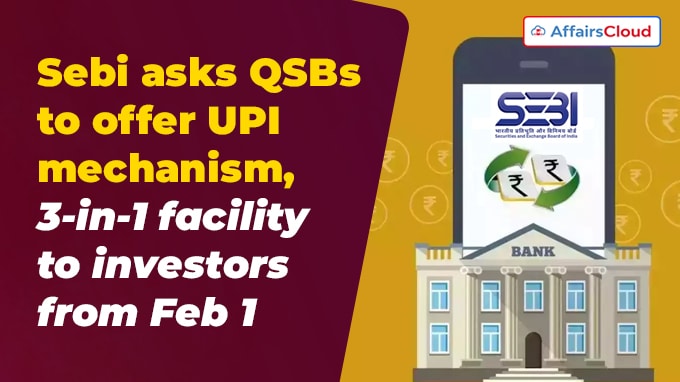
On 11th November 2024, the Securities and Exchange Board of India (SEBI) has directed all Qualified Stock Brokers (QSBs) to offer either the facility of trading in the secondary market using the Unified Payments Interface (UPI)-based block mechanism to their clients similar to Application Supported by Blocked Account (ASBA) facility or the 3-in-1 trading account facility to their investors.
- This new direction for QSBs will come into effect from 1st February, 2025.
Note: SEBI defines QSBs as entities which, by virtue of their size and scale of operations, can impact investors and the securities market.
Key Points:
As per SEBI’s directions, these QSBs are now required to offer one of these facilities, in addition to the current mode of trading.
- Trading Members (TMs) are classified as QSBs based on various parameters such as: the size and scale of their operations, including the number of active clients, the total assets held by clients with the TM, the end-of-day margin of all clients, and the trading volume of the TM.
UPI block mechanism:
i.A UPI block mechanism will enable the clients to trade in the secondary market based on blocked funds in their bank accounts instead of transferring the funds upfront to the trading member.
ii.These funds will remain in the investor’s bank account, but they will be unavailable for other use until the trade is completed.
iii.It aims to reduce risks related to defaults by TMs and Clearing Members (CMs).
3-in-1 trading account:
i.The 3-in-1 trading account facility combines a savings account, a demat account, and a trading account into a unified integrated solution.
ii.In this case, the clients would have their funds in their bank account, earning interest on the cash balances.
Points to Note:
i.SEBI introduced the UPI block mechanism in January 2019, which initially served as a payment method for retail investors participating in public share issues in the primary markets.
ii.Later, this mechanism was extended to the secondary market in January 2024. A beta version of this mechanism was rolled out for individual investors and Hindu Undivided Families (HUFs) which is applicable only to the cash trading system.
Click here to more Information
Recent Related News:
The Securities and Exchange Board of India (SEBI) has established a dedicated Foreign Portfolio Investor(FPI) Outreach Cell to focus on direct engagement with FPIs and to support FPIs in accessing the Indian Securities Market seamlessly.
- This was as part of SEBI’s Alternative Investment Fund (AIF) and FPIs Department (AFD).
About Securities and Exchange Board of India (SEBI):
SEBI is the apex regulatory body for securities and commodity market in India. It was initially established as a non-statutory body in April 1988. Later, SEBI was accorded the status of statutory body through SEBI Act, 1992 on 30th January, 1992.
Chairman- Madhabi Puri Buch
Headquarters- Mumbai, Maharashtra




